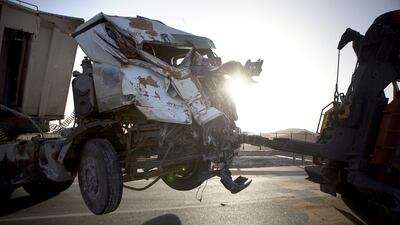ABU DHABI // Lorries that are more than 20 years old should be taken off the road, and their drivers’ licences should take into account age and experience, safety experts say.
“Many heavy goods vehicles are death traps,” said Robert Hodges, a road safety specialist.
“We seem to have hundreds, perhaps thousands of worn-out and potentially dangerous heavy-goods vehicles in daily use. These are too old, usually overloaded or incorrectly loaded.
“They are driven for months, even years with absolutely no servicing or maintenance except when there is a failure. They typically have several tyres with little or no tread and mixed tyre sizes.”
Mr Hodges said there should also be tiered drivers’ licences.
“A young man can arrive fresh in the UAE having never driven anything and can take a few lessons in a normal car, with no test to be taken before he moves on to training in a rigid, non-articulated lorry of between 3.5 to 7.5 tonnes gross vehicle weight.
“Heavy vehicle licences should be based on tests and on drivers’ ages and experience, so that more mature and experienced drivers at the wheel of a six-axle 22-wheel lorry hauling 35 tonnes of rocks down from the mountains are of the highest skill,” Mr Hodges said.
In December 2015, the Department of Transport in Abu Dhabi introduced strict tests to ensure all heavy vehicles were roadworthy.
Dubai’s Roads and Transport Authority is looking at phasing out older lorries, said Mohammed Nabhan, director of its licensing agency.
“The process is complex and has to be done in a gradual manner so as not to disturb industry,” Mr Nabhan said.
Vehicle checks are carried out daily at various spots, and action taken against offenders, he said.
About 13,000 of the more than 22,000 heavy vehicles checked by the authority in the first half of last year failed to pass inspection.
The authority impounded 301 lorries for posing “a threat to traffic and road users”, and found major faults in nearly 10,000. They found problems with tyres, overloading and faulty lights and signals.
The agency is looking at standardising the driver training curriculum and has submitted proposals to the Ministry of Interior. One is creating two categories for heavy articulated and non-articulated vehicles.
It has also made it mandatory for all heavy vehicles more than 20 years old in Dubai to be fitted with telematics devices by August 1. If the vehicles’ owners do not comply, their registration will not be renewed.
Telematics devices track vehicles’ defects and monitor driver behaviour such as speeding and harsh braking. Since February, 300 lorries have been fitted with the device.
“Telematics must be fitted to all heavy-goods vehicles, with no exceptions,” Mr Hodges said. The transport authority yesterday said that the system introduced was “standard across the board”.
Older vehicles lack the intrinsic safety features that one expects from modern-day vehicles such as stability control and anti-lock brakes, said Qasim Shah, regional marketing manager at MiX Telematics.
“While such features are highly effective in an emergency situation, prevention is still the best cure,” Mr Shah said.
Fleet owners need to understand the benefits of investing in continuous and proactive driver safety training, he said.
“Unfortunately, many ignore driver training or perform cursory minimal training until after a major incident occurs.”
Glenn Havinoviski, a US transport expert, said there was a good case for taking old lorries off the road, although newer vehicles could also be dangerous if not regularly maintained or inspected.
“A federal database linking heavy vehicle registration with registered drivers of these vehicles could perform a similar function as the US commercial vehicle information systems and networks,” Mr Havinoviski said.
“This documents vehicle inspections and driver credentials in a database in each US state for all commercial companies and their vehicles.”
rruiz@thenational.ae

